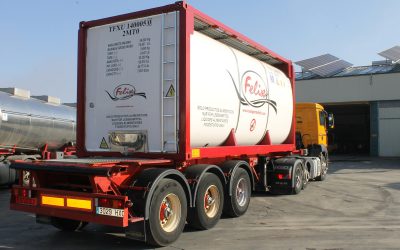Are you looking for a freight forwarder to operate the transport of goods? You also export abroad? If that’s the case, you’ve probably heard about intermodal transport. If you’re not sure exactly what intermodal transport is, we’ll give you some clues to understand how the long-distance freight mode works.
What is intermodal transport?
To define intermodal transport in a few words, we could say that it is the combination of different means of transport using a single container. In general, adaptable containers are used to transport all kinds of goods by different means of transport. In this way, the freight forwarding process is faster and more efficient.
This process allows for transportation in several ways: land transport (road or rail) and maritime or river transport. By the fact that the transport is done on several vehicles to reach its final destination, it is called multimodal.
In summary, combined or intermodal traffic is characterized by the use of at least two different means of transport to transport the goods, without a change of container being made.
How does intermodal transport work?
The main advantage of this mode of transport is the absence of transfer of goods from one container to another and thus contact of the product with air or germs. This ensures total protection of the product. This process is ideal for international transport where good supply chain management is vital.
In most cases, the goods are first transported by truck. Road transport thus corresponds to the first stage to its first point of transfer. In general, road transport is adapted to shorter distances, freight forwarding the goods to the train or the boat that will transport it later. Then, the entire container carrying the goods will be transferred to another means of transport, without the goods being changed from one container to another for purposes of transport. Lastly, a last truck transfers the goods from the unloading point to the destination point.
Why is intermodal transport ideal for the transport of food grade liquids?
In the case of the transport of food grade liquids, intermodal transport seems all the more necessary, as the products are perishable, very delicate, and they must be transported under ideal conditions to maintain their quality and properties. It is essential to ensure that the merchandise has retained all its qualities and of course that it is free of sanitary risks.
For this reason, precise and determined logistics are essential to achieve health and quality objectives. This is where intermodal transport comes into play, a process mastered by a few companies only because of the complexity of the protocols to be followed. Putting this process into practice is the ideal solution for ensuring the safety and quality of food grade liquids, thanks to the strict respect of temperatures and the optimal conditions of freight forwarding.
6 advantages of the intermodal transport
Intermodal transport makes it possible to combine all the advantages of the different means of transport available:
- Transport capacity in large quantities over long distances.
- Minimizes waiting times on the road and dispense with the need for storage at intermediate steps.
- Reduces the risk of damage to the goods thanks to closed container transport from the point of departure to the point of arrival.
- Improves safety by its limited time on the road, as well as the environment thanks to reduced CO2 emissions.
- Reduces the risk of robbery thanks to the constant control of the process from the departure to the delivery and the preservation of the goods within the same container.
- Reduces costs thanks to greater transport capacity simplifying processes.
You are now informed about the intermodal transport process, and undoubtedly wish to enjoy its many advantages. Do not hesitate and contact us to take advantage of our intermodal transport services!

